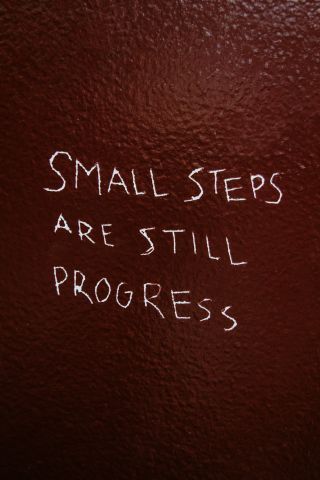Written by guest author and SelfWorks therapist, Megan Lothian, LCSW.
There is much pressure societally to define and measure “achievement” and “success.” There is a societal and cultural preference for most things to be quick, easy, and, if possible, painless. Inevitably, these notions of success, and a desire for a painless and quick resolve, appear within therapy.
In my experience, people often find themselves in therapy because they have been experiencing “too much,” whether it be acutely in a short amount of time causing overwhelm and anxiety, or in a chronic way, often manifesting in depressive mood and symptoms. They want to feel differently than the way they are currently feeling. Struggling with an excess of anxiety, low mood, interpersonal and relational issues over a period of time, etc.—it is uncomfortable and can be difficult to manage.
It is understandable then that people come to therapy wanting to make their pain go away as quickly as possible. Questions often arise like “How do I fix ___?”; “Am I getting better?”; “How long will this take?”; and “Do you [the therapist] think I have made progress?” Dr. Jonathan Shedler talks about the symptoms that bring people in to therapy, most typically depression and anxiety, as being the “psychological equivalent of fever.” We know we feel bad, but why do we feel bad?” The search for the why often takes time and is in direct conflict with the rush for achievement and success.

Small Steps
Source: Hayley Murray / Unsplash
In other situations, progress is happening, but it isn’t recognized as such. People can often hold on to the narrative about why they are not making enough progress. Some of these narratives can be surrounding outward markers of success given to us by society, like relationship status or a place in one’s career. Some may be more about internal emotional experiences manifesting in certain symptoms, or ways of coping that the person wants to change but is finding it difficult to do so. These narratives, if too rigid, can act as a barrier, impeding one’s ability to see the ways that they are progressing.
This progression may be happening in ways that don’t fit their original narrative of what a “successful” therapy looks like. Over time, progress means not only symptom improvement but also a richer, freer life (Shedler, 2010). Jon Kabat-Zinn talks about meditation not being a solution to all your problems, but it can help you approach difficulties in life with more clarity and purpose, and I think about psychotherapy in a somewhat similar sentiment. We are not “solving a problem” or “fixing”; we are taking the time to better understand all of our various parts, past and present, in hopes of gaining more clarity.
So how do we get to this richer, freer feeling, and the capacity to tolerate the breadth of our emotional experience? Subtle shifts and changes within ourselves are important to notice, and build up over time, to a difference in the way that we view ourselves and our emotional world. Can we think about progress as being not an elimination of but, rather, an increased ability to manage and understand what we are feeling? This could look like being curious and more able to articulate our internal emotional world in a way that we could not before. One can notice patterns being recreated and construct a narrative of events to date that makes sense emotionally, developmentally, and cognitively. This collective understanding then informs future experiences.

Progress
Source: Edward Howell / Unsplash
Examples of progress from this lens may look like the following:
- Someone who has harsh or critical internal objects beginning to notice ways they can be gentler with themselves and others in varying realms of life
- Someone having more confidence that they can sit in their feelings of anxiety, for example, and have a deeper understanding of where those feelings are coming from, while simultaneously holding on to the fact that they will pass
- Someone who finds asking for help to be difficult being more capable of resourcing or reaching out for support from others
- Someone who finds it difficult to take up space beginning to advocate for themselves and reflecting on this push and pull that can occur in their relationships
- Someone who finds it difficult to do something differently in personal relationships related to their own needs or boundaries actually having a different response and feeling valid in doing so
- Someone feeling more present and connected to their body while working through difficult emotions or reflections of an experience
“Ultimately, there are basic truths of human psychology that most people understand intuitively. We do not fully know ourselves; the things we do not know can cause suffering; and there is benefit in deepening self-awareness. Psychodynamic therapy is based on these truths and has demonstrated its benefits scientifically” (Shedler, 2010).
However, this experience of psychotherapy takes time.
It is a tolerance for wider range of emotions within the self, and in the context of relationships, that leads to a deeper understanding of oneself, others, and the world. I think that is what is meant by a richer and freer life; a life not lacking difficult emotions or experiences, but a life where you can better understand, feel supported in, and internalize meaning from your emotions and experiences, and use these collectively to guide your decisions and goals.




















+ There are no comments
Add yours